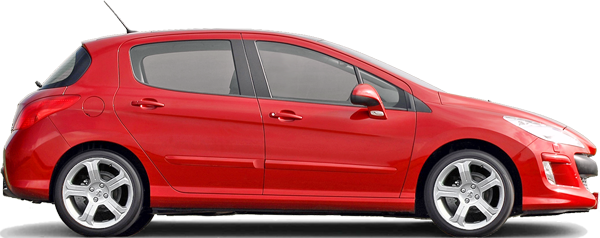The Comparative Analysis :
Hyundai i30 1.0 T-GDI (17 - 18) vs. Peugeot 308 5-door HDi FAP 135 DPF (07 - 08)
€ 19,900

€ 23,300

€ 19,900
Base Price ⓘBase price of a new vehicle with standard equipment in Germany at market launch.
€ 23,300
ⓘBase price of a new vehicle with standard equipment in Germany at market launch. Price Info
Vehicle Dimensions
The dimensions of these vehicles differ slightly. The Hyundai i30 1.0 T-GDI is 6.4 cm longer, 2 cm narrower and 4.3 cm lower than the Peugeot 308 HDi FAP 135 DPF.
Hyundai i30 1.0 T-GDI
Peugeot 308 HDi FAP 135 DPF
1455
1795
2050
1498
1815
2038
1795 mm
Width
1815 mm
2050 mm
Width Incl. Mirrors
2038 mm
1455 mm
Height
1498 mm
2650
4340
2608
4276
4340 mm
Length
4276 mm
2650 mm
Wheelbase
2608 mm
Vehicle Weight
Hyundai i30 1.0 T-GDI
Peugeot 308 HDi FAP 135 DPF
1269 kg
Kerb Weight
1496 kg
1800 kg
Gross Vehicle
Weight
Weight
1921 kg

Weight Difference:
227 kg
15.17 %

General
Hyundai i30 1.0 T-GDI
Peugeot 308 HDi FAP 135 DPF
PDE
Generation
4*
Hatchback
Car Body Style
Hatchback
Unleaded (95 RON)
Fuel Type
Diesel

Front-wheel drive
Drive
Front-wheel drive

6-speed manual transmission
Transmission
6-speed manual transmission
Engine
Hyundai i30 1.0 T-GDI
Peugeot 308 HDi FAP 135 DPF
Straight-three petrol engine with turbocharger
Engine Type
Straight-four diesel engine with turbocharger
Engine Code
RHR, RH01
4
Valves
4
3
Cylinders
4
998 CC
Engine Capacity
1997 CC
118 bhp
at 6000 rpm
Power
134 bhp
at 4000 rpm
Hyundai i30 1.0 T-GDI
118 bhp
134 bhp
Peugeot 308 HDi FAP 135 DPF
171 NM
at 1500 rpm
Max. Torque
320 NM
at 2000 rpm
Hyundai i30 1.0 T-GDI
171 NM
320 NM
Peugeot 308 HDi FAP 135 DPF
Performance
Hyundai i30 1.0 T-GDI
Peugeot 308 HDi FAP 135 DPF
118 mph
Maximum Speed
127 mph
11.1 sec
Acceleration 0 to 62 mph
10.1 sec
62 mph
62
mph
mph
154 m
0.000 sec

Hyundai i30 1.0 T-GDI
62 mph
62
mph
mph
140 m
0.000 sec

Peugeot 308 HDi FAP 135 DPF
▶ REPLAY
10.75 kg/bhp
Weight-to-Power Ratio
11.16 kg/bhp
Hyundai i30 1.0 T-GDI
10.75 kg/bhp
11.16 kg/bhp
Peugeot 308 HDi FAP 135 DPF
Fuel Economy / Emissions
Hyundai i30 1.0 T-GDI
Peugeot 308 HDi FAP 135 DPF
Fuel Economy
58 mpg
combined
53 mpg
Hyundai i30 1.0 T-GDI
58 mpg
53 mpg
Peugeot 308 HDi FAP 135 DPF
50 mpg
city
40 mpg
64 mpg
motorway
66 mpg
50 L
Fuel Tank Capacity
60 L
634 mi
Range
703 mi
Hyundai i30 1.0 T-GDI
634 mi
703 mi
Peugeot 308 HDi FAP 135 DPF
Environmental Impact
92.9 kWh
Total Energy Consumption
per 100 miles ⓘThe total energy consumption per 100 miles is the amount of energy consumed by a vehicle when burning fuel or using electricity per 100 miles (final energy), and the energy required to produce the appropriate amount of fuel or electricity (primary energy).
per 100 miles ⓘThe total energy consumption per 100 miles is the amount of energy consumed by a vehicle when burning fuel or using electricity per 100 miles (final energy), and the energy required to produce the appropriate amount of fuel or electricity (primary energy).
109.1 kWh
Hyundai i30 1.0 T-GDI
92.9 kWh
109.1 kWh
Peugeot 308 HDi FAP 135 DPF
Euro 6b (NEFZ)
Emission Standard
Euro 4
112 g/km (NEFZ)
CO2 Emissions
140 g/km (NEFZ)
Practical Convenience
Hyundai i30 1.0 T-GDI
Peugeot 308 HDi FAP 135 DPF
5
Doors
5
5
No. of Seats
5
531 kg
Maximum Payload
425 kg
395 L
Boot Capacity
348 L









1301 L
Boot Capacity (Seats Down)
1201 L














